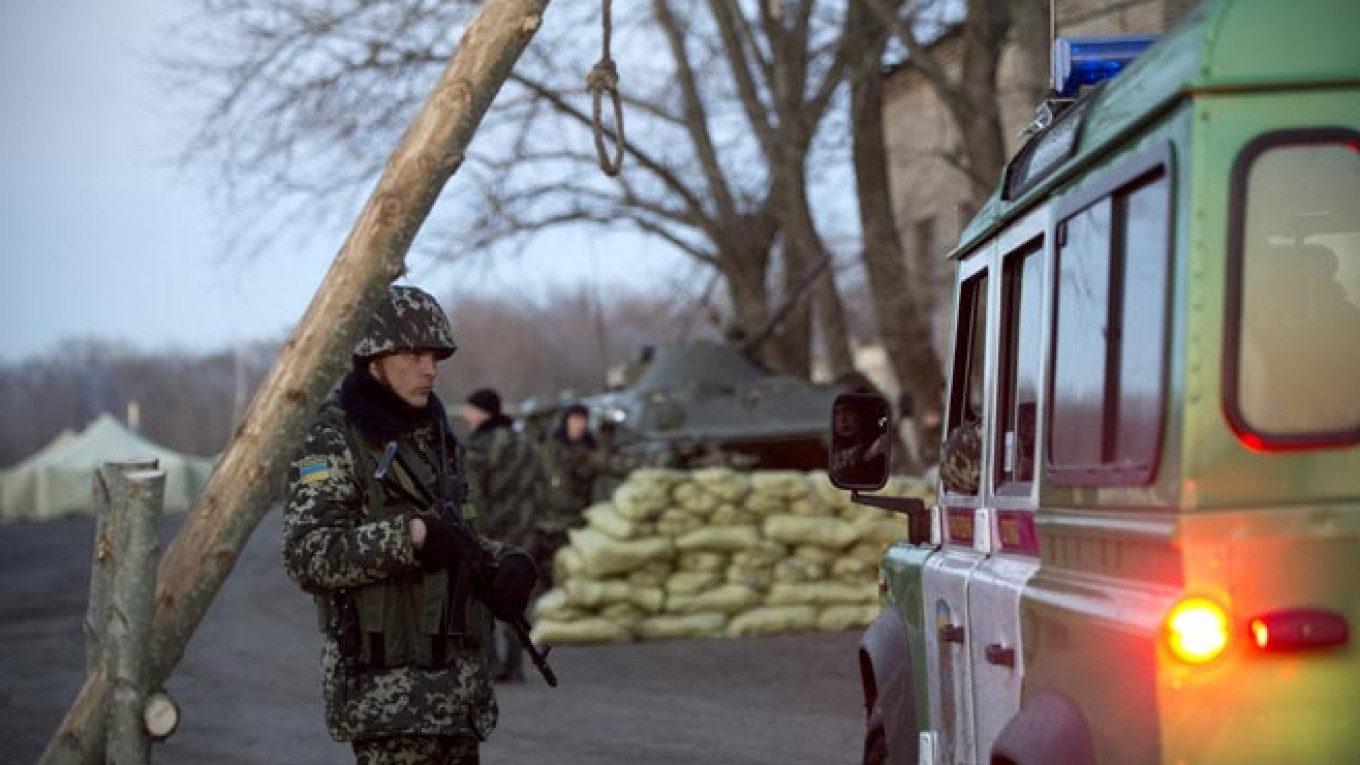SNEZHNOYE, Ukraine — While Russia formally takes control of Crimea, tensions have shifted to eastern Ukraine, where both Russian and Ukrainian military forces are concentrated along the shared border.
In the poverty-stricken industrial towns in Ukraine's Donetsk region near the border, local self-defense groups have been forming to protect the area from what they see as an imminent threat from western Ukraine.
Ivan Seleznev, 34, a well-built miner, is a local activist of the so-called Ukrainian Eastern Front organization, which, according to him, has more members than Ukraine's National Guard, which is currently managed by the fledgling pro-Western government in Kiev.
A trip along the Ukraine-Russia border reveals how Ukraine prepares for the possibility of military conflict. Filmed on March 23.
"It was a mistake to include our region into Ukraine. We are part of Russia," said Seleznev, sitting in Snezhnoye's only cafe.
Snezhnoye is only 15 kilometers from Russia. Many people make their living here by smuggling petrol from the nearest Russian towns.
Many miners in this town and dozens of other surrounding towns were left on the streets after the collapse of the Soviet Union. The area that once flourished today resembles a string of ghost towns along the dark highway from Russia to Donetsk.
Since state-run mines were shut down, many workers had to dig makeshift shafts themselves, usually without proper ventilation and structural support. Hundreds of miners died in such unlicensed mines every year.
Seleznev worked in one of these mines, known as "kopanki," and many of his friends perished there. Years of mismanagement and economic despair made him look to Russia, where he has extended family connections, for relief.
"People in the government and in western Ukraine think of us as some kind of inferior people," he said, sipping tea. "We will prove them wrong," he said.
"It is not about Russia as such, we just want some positive change in our lives," said Seleznev.
"We are not against Ukraine, it just failed to provide us with the opportunities we need," he said.
While we sit and talk, other guests in the cafe and staff members join the conversation, all listing their grievances and supporting Seleznev's words.
At the same time, however, in the neighboring town of Kramatorsk, local residents have been forming their own groups that aim to unleash a partisan war if Russia invades their territory.
A rift between ordinary Ukrainians is visible in Snezhnoye as well, where Seleznev says everybody with divergent views would be beaten up. Many people in Snezhnoye said they would support the Russian Army and do not want Ukrainian forces in their region.
In the neighboring village of Alekseevskoye, just 600 meters from the Russian border, the Ukrainian military has set up a little camp for several hundred soldiers.
The head of the camp, Colonel Igor Mamut, dismissed opposition from the local population, saying that "many smugglers are against us being here because it makes business more difficult for them."
The camp has no military vehicles and was established only to offer practice on the ground to the soldiers, most of whom came from central Ukraine.
Despite the growing tensions on the border, Mamut had a positive outlook and doubted there would be any military activity.
"We are two brotherly nations and have nothing to divide. My soldiers feel the same way," said Mamut, who served in a special KGB force in Afghanistan.
Many officers and soldiers said they had been transferred to Ukraine's eastern border after the government in Kiev became concerned that Russia would invade the area.
In front of the Malinovka border checkpoint, some five kilometers from the military camp, giant breakwater structures have been installed to prevent Russian tanks from rolling in.
Officials at the checkpoint were wary about visits from journalists and were reluctant to comment. They followed our car when we travelled back and, according to the driver, tried to harass us on the road.
Contact the author at [email protected]
A Message from The Moscow Times:
Dear readers,
We are facing unprecedented challenges. Russia's Prosecutor General's Office has designated The Moscow Times as an "undesirable" organization, criminalizing our work and putting our staff at risk of prosecution. This follows our earlier unjust labeling as a "foreign agent."
These actions are direct attempts to silence independent journalism in Russia. The authorities claim our work "discredits the decisions of the Russian leadership." We see things differently: we strive to provide accurate, unbiased reporting on Russia.
We, the journalists of The Moscow Times, refuse to be silenced. But to continue our work, we need your help.
Your support, no matter how small, makes a world of difference. If you can, please support us monthly starting from just $2. It's quick to set up, and every contribution makes a significant impact.
By supporting The Moscow Times, you're defending open, independent journalism in the face of repression. Thank you for standing with us.
Remind me later.






